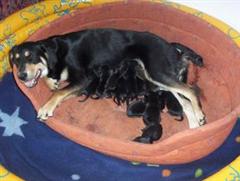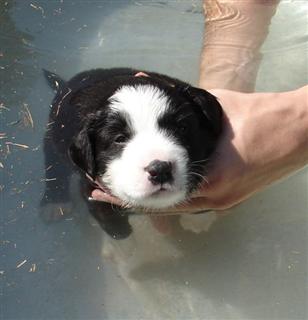|
IMPENDING LABOR
When your dog's due date is approaching, you should begin monitoring her rectal temperature. When her temperature drops below 100o F (normal canine temperature is 101-102o F), labor may be expected within 24 hours.
THE FIRST STAGE OF LABOR
During this stage, uterine contractions begin. The bitch will appear very restless and may pace, dig, shiver, pant, or even vomit. This is all normal and all an owner can do is see that the bitch has water available should she want it. This stage of labor is very long, lasting 6-12 hours and culminates with full dilation of the cervix in preparation to expel a puppy.
THE SECOND AND THIRD STAGES OF LABOR
The second stage is the "hard labor" stage in which the puppy is expelled. The third stage refers to the expulsion of the placenta and afterbirth. Each pup may not be followed by afterbirth; the mother may pass two pups and then two placentas. This is normal.
Puppies are born covered in membranes which must be cleaned away or the pup will suffocate. The mother will bite and lick the membranes away. Allow her a minute or two after birth to do this; if she does not do it, then you must clean the pup for her. Simply remove the slippery covering and rub the puppy with a clean towel. The umbilical cord may be tied in a knot about one inch from the pup and cut with scissors on the far side of the knot.
Expect one pup every 45-60 minutes with 10-30 minutes of hard straining. It is normal for bitches to "take a rest" partway through delivery and she may not strain at all for up to four hours between pups. If she is seen straining hard for over one hour or if she takes longer than a four hour break, a veterinarian should be consulted.
Expect some puppies (probably half of them) to be born tail first. This is not abnormal for dogs.
CALL YOUR VETERINARIAN IF:
- 30-60 minutes of strong contractions occur with no puppy being produced.
- Greater than four hours pass between pups and you know there are more inside.
- She fails to go into labor within 24 hours of her temperature drop.
- She is in obvious extreme pain.
- Greater than 70 days of gestation have passed.
It is normal for the bitch to spike a fever in the 24-48 hours following birth. This fever should not be accompanied by clinical signs of illness.
Normal vaginal discharge after parturition should be odorless and may be green, dark red-brown or bloody and may persist in small amounts for up to 8 weeks.
PROBLEMS TO WATCH FOR...
METRITIS (INFLAMMATION OF THE UTERUS)
Signs of this condition are as follows:
- fever
- foul-smelling vaginal discharge
- listlessness
- loss of appetite
- no interest in the puppies
- decreased milk production
If these signs are noted, usually in the first day or two postpartum, a veterinarian should be consulted. Your dog may have retained a placenta or have suffered some trauma during delivery. Animals who have required assistance with delivery are often predisposed to metritis.
ECLAMPSIA
This condition results when the bitch has trouble supporting the calcium demand of lactation. Calcium supplementation predisposes a bitch to this condition. Usually affected animals are small dogs. They demonstrate:
- nervousness and restlessness
- no interest in the pups
- stiff, painful gait
This progresses to:
- muscle spasms
- inability to stand
- fever
- seizures
This condition generally occurs in the first three weeks of lactation and a veterinarian should be consulted immediately.
MASTITIS (INFLAMMATION OF THE BREASTS)
Normal nursing glands are soft and enlarged. Diseased glands are red, hard, and painful. In general, the bitch does not act sick; the disease is confined to the mammary tissue. The bitch may be sore and discourage the pups from nursing; however, it is important to keep the pups nursing the affected glands. This is not harmful to the puppies and helps flush out the infected material. Hot packing may be helpful.
Most dogs are excellent mothers and problems are few. The basic rule is to seek veterinary care if she seems to feel sick of if she ceases to care for her young. Puppies nurse until they are about six weeks old and then may be fully separated from their mother. A good age for adoption to a new home is 8 weeks or later.
References:
Marvistavet
|


